Facts about Mosquito

Female mosquitoes also utilize nectar as their main energy source, but almost all species require a blood meal to mature their eggs for reproduction.
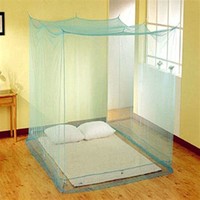
Nets are treated with insecticide because mosquitoes can sometimes get past an imperfect net.

Female mosquitoes are particularly reviled for their annoying bites and as vectors of devastating diseases.

Some newer mosquito traps emit a plume of carbon dioxide together with other mosquito attractants such as sugary scents, lactic acid, octenol, warmth, water vapor, and sounds.

Most species of mosquito can carry the viral diseases yellow fever, dengue fever, epidemic polyarthritis, Rift Valley fever, Ross River Fever, and West Nile virus.

Some of the sensitizing antigens are common to all mosquito species, whereas others are specific to certain species.
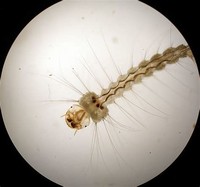
Some mosquito larvae, such as those of Wyeomyia live in unusual situations.

Other popular methods of household mosquito control include use of small electrical mats, mosquito repellent vapor, and mosquito coil, all containing a form of the chemical allethrin.

Only some species of mosquitoes are vectors of disease; many are host-specific and that host does not include humans, or they do not carry the parasitic agent.

By mimicking a mammal, these factors draw female mosquitoes toward the trap, where they are typically sucked into a net or holder where they collect.

Organized mosquito control programs today draw on the principles of integrated pest management.

The most effective solutions for malaria control efforts in the third world are: Mosquito nets, mosquito nets treated with insecticide (often permethrin), and DDT (NCID 2006).
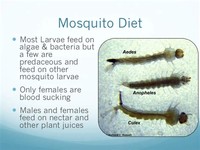
Most larvae feed on microorganisms, but a few are predatory on other mosquito larvae.

Often the best "repellent" is a fan or gentle breeze as mosquitoes do not like moving air.

Mosquitoes in flight emit a distinctive high-pitched buzz, which can interrupt sleep.

The mosquito undergoes complete metamorphosis, going through four distinct stages in its life cycle: Egg, larva, pupa, and adult—a process that was first described by the Greek philosopher Aristotle.

Defensive measures for protecting against the discomfort and health threat of mosquitoes include vaccines, insect repellents, and mosquito nets.

Female mosquitoes that require or use human blood may also transmit protozoans, bacteria, and viruses and thus are major vectors of disease.

Mosquitoes are believed to have evolved around 170 million years ago during the Jurassic era (206–135 million years ago) with the earliest known fossils from the Cretaceous era (144–65 million years ago).

Insecticide-treated nets (ITN) are estimated to be twice as effective as untreated nets in preventing mosquito bites (Hull 2006).

The feminine aspect of maya has been personified as Mahamaya ("great Maya"), a great goddess responsible for the creation of the physical world.

Mosquitoes have characteristic scaled wing venation and, as noted above, females are known for their long proboscis.

The mossery is typically constructed out of slatted wood, with a flat roof, open to the north side (maintaining shade).

Empirical studies of mosquito bites suggest that the risk of being bitten follows an approximately negative binomial distribution.

Some adults can become desensitized to mosquitoes and have little or no reaction to their bites, while others can become hyper-sensitive with bites causing blistering, bruising, and large inflammatory reactions.
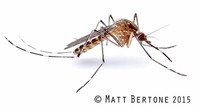
Many species of mosquito live their adult stage in roughly two weeks to two months.

Heartworm is a parasitic roundworm that is spread by mosquitoes to dogs, cats, wolves, sea lions, and even humans, among others.

An easy way to reduce mosquito populations in a residential area is the removal of standing water (where mosquitoes breed), and an effective preventive measure is the use of repellents, such as DEET.

The relative effectiveness of these newer mosquito traps is still being studied.

Olivia Judson, an evolutionary biologist, advocates the deliberate extinction of 30 mosquito species through the introduction of recessive "knockout genes" (Judson 2003).

Some newer mosquito traps emit a plume of carbon dioxide together with other mosquito attractants such as sugary scents, lactic acid, octenol, warmth, water vapor, and sounds.

A mosquito's period of feeding is often undetected; the bite only becomes apparent because of the immune reaction it provokes.

Mosquitoes of the genus Aedes (in Africa) and Haemagogus and Sabethes (in South America) transmit the virus that causes yellow fever.

Similarly, bug zappers kill a wide range of flying insects including many beneficial insects as well as mosquitoes; bug zappers are not effective at controlling mosquito populations.

Malaria is caused by a protozoan of the genus Plasmodium that utilizes some species of the mosquito genus Anopheles in transmission.

Mosquitoes can detect heat, so they can find warm-blooded mammals and birds very easily once they get close enough.

Mosquitoes of the genus Culex (a vector for St. Louis encephalitis) overwinter as mated adult females.

Viruses carried by arthropods such as mosquitoes or ticks are known collectively as arboviruses.

The role of DDT in combating mosquitoes has been the subject of considerable controversy.

Mosquito is a common term for any member of the insect family Culicidae of the order Diptera ("true flies").

Untreated mosquito nets are less expensive, and they are effective in protecting humans when the nets do not have any holes and are tightly sealed around the edges.
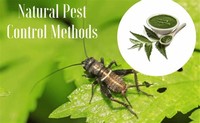
Some lettuces (especially iceberg) have been specifically bred to remove the bitterness from their leaves.

Mosquito repellents generally contain one of the following active ingredients: DEET (Meta-N,N-diethyl toluamide), catnip oil extract, nepetalactone, citronella, or eucalyptus oil extract.

Mosquito repellent candles containing Citronella oil is another method to keep mosquitoes at bay.
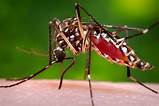
Most mosquito species outside of the tropics overwinter as eggs, but a significant minority overwinter as larvae or adults.
Mosquitoes seem to serve no purpose other to annoy us. But from the mosquitoes' point of view, their purpose is to make more mosquitoes. From the point of view of birds, fishes, frogs and other animals that eat them, their purpose is to provide a source of food.
Only female mosquitoes bite and feed on the blood of humans or warm-blooded animals. If a mosquito finds enough victims to bite and avoids being squashed, it can live as long as three weeks. During that time, it may lay up to five clutches of more than 100 eggs each.Jul 15, 2011
Mosquitoes seem to serve no purpose other to annoy us. But from the mosquitoes' point of view, their purpose is to make more mosquitoes. From the point of view of birds, fishes, frogs and other animals that eat them, their purpose is to provide a source of food.
Scientists have discovered that the mosquito's mouth, called a proboscis isn't just one tiny spear. It's a sophisticated system of thin needles, each of which pierces the skin, finds blood vessels and makes it easy for mosquitoes to suck blood out of them. ... The mosquito uses them to saw through the skin.Jun 7, 2016
These muscles cause the tube to expand and contract, producing a worm-like peristaltic pumping action. Most of the time, the heart pumps the mosquito's blood—a clear liquid called hemolymph—toward the mosquito's head, but occasionally it reverses direction. The mosquito doesn't have arteries and veins like mammals.Oct 15, 2010


